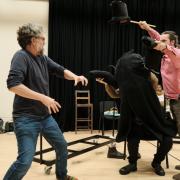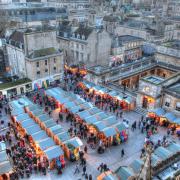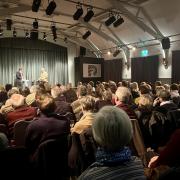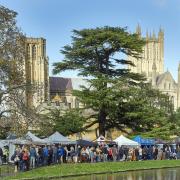It was 20 years ago this month that we were selecting our first numbers and crossing our fingers as the National Lottery made its debut. PETER NALDRETT takes a look at good causes that have benefited from Lottery funding across Somerset.

Has it really been two decades since we first went to have a go on the Lottery? Though it may be hard to believe, it is true. The first balls that gave us big winners were picked out in November 1994. It was a time when John Major was still Prime Minister, Whigfield was riding high in the charts with Saturday Night and Michael Schumacher won his first World Championship. The message in the adverts at the time was simple: Pick six balls and you could win a fortune. ‘It could be you’ we were told.
And so, after spending ages choosing my six numbers and carefully picking digits that had special meaning for me, I went to the newsagents and handed over £1 for a ticket. But the much-hyped TV show on the Saturday came and went without making me a millionaire, just like all the subsequent draws. I won £10 that first week, but that’s pretty much the extent of my Lottery luck. Twenty years have now passed and the way we play the National Lottery has changed a lot in those two decades; there are more draws, scratch cards to tempt us and ways to take part online. But the principal is the same: spending a few pounds on the chance of making a fortune.
There is, of course, another side to the National Lottery and it’s a side that has had a big impact in Somerset since 1994. Since the outset, 28 per cent of National Lottery sales has been designated to a good causes fund, which boosts all kinds of projects up and down the country. So far, more than £20billion has been awarded through the funding programme, a considerable benefit created by the queues of people lining up for tickets in supermarkets.
One of the most high profile cases to move forward with Lottery funding is the Roman Baths in Bath. Earlier this year it benefited from a huge £372,500 Heritage Lottery Fund grant that will help it to develop an exhibition showing off one of the largest hauls of Roman coins ever found. There were 17,577 silver Roman coins discovered in Beau Street – just 150 metres from the Roman Baths – in 2007. Archaeologists say they were placed in eight pouches and date back to 32BC.
Nerys Watts, Head of the Heritage Lottery Fund South West, said: “The Beau Street hoard is such an exciting discovery and this project will help everyone develop a better understanding of one of the most fascinating periods in the history of Bath. We’re proud to be funding these well thought out plans that will save the collection and ensure that the coins are held locally, meaning that people from the surrounding community, as well as visitors from further afield, can learn about and enjoy them long into the future.”
The award will give thousands the opportunity to learn more about the ancient history of Somerset, but another given this year will allow local folk to explore events that happened more recently. It is, of course, 100 years since World War One broke out and a grant of £9,800 has been awarded to Tacchi-Morris Arts Centre and Taunton Youth Dance Company to help their First World War: Then And Now project.
Part of a country-wide initiative called War and Peace that commemorates the centenary of the war through dance, the Somerset project has involved schools, community groups and professional dancers.
Jenny Copping is the Artistic Director of Taunton Youth Dance Company. She said: “We are delighted about news of the grant. This project offers fantastic opportunities across the county and will enable us to commemorate the centenary in an imaginative way that captures the public imagination. The project will pull in a variety of local partners including Somerset Heritage Centre, The Museum of Somerset, The Tacchi-Morris Trust and many others.”
Artistic Director of the Tacchi-Morris Arts Centre, Louise Lappin-Cook, adds: “The funding has been fantastic and is offering a huge range of creative opportunities for dancers across the county to explore the role of Somerset women in World War One and to share their work with audiences locally.”
But such high profile cases are not the only ones to benefit in Somerset. Over the past 20 years, small groups have received small but significant sums that help their cause, such as the Somerset Bee Keepers Association being given £1,750 in February 2000, the Somerset Wildlife Trust £9,000 in 1998 and West Somerset Railway Association receiving just over £6,000.
Between 2008 and 2010, an award of nearly £50,000 led to a project to restore the 16th century St Patrick’s Chapel in the grounds of Glastonbury Abbey. The 17- month project, now complete and resulting in 60,000 people visiting it a year, was undertaken by local people with a variety of special needs. Volunteers worked to strip away modern cement and replace it with lime-based products, while a professional mural painter was brought in, along with a stained glass artist, to help the restoration. With stunning results, this project has helped a centuries old building look great for generations to come.
The Lottery funding is not restricted to historical and cultural projects though; one of the county’s biggest awards has tried to help a rare creature thrive in the South West. The lesser horseshoe bat has declined in numbers significantly over the past 100 years and many of the remaining 20,000 live in the Somerset area. Now a priority species, local councils applied for a grant and were given £178,500 to continue their preservation work. It is another example of some good coming from those people who spend an often fruitless pound every week.
So when those numbers go against you and you experience yet another Saturday night devoid of winning a million, at least you can sit back and think about all the 28 pences that have gone towards good causes over the years – especially those giving the communities of Somerset a boost.



























